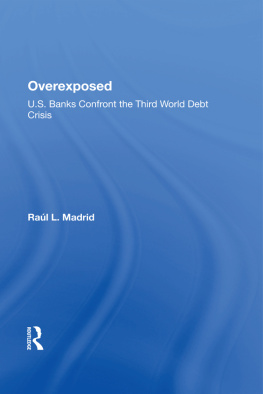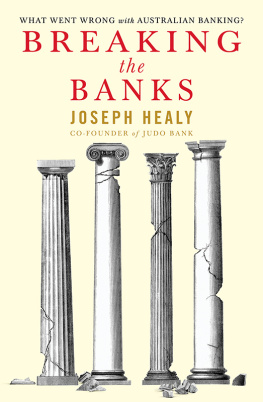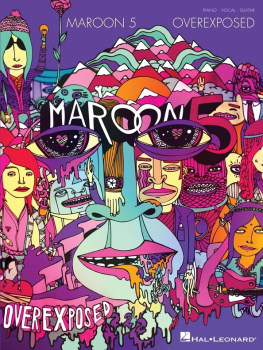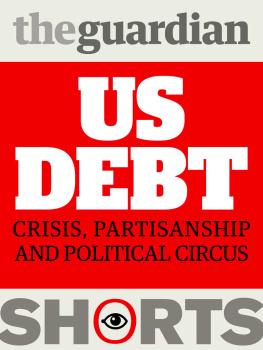First published 1992 by Westview Press
Published 2019 by Routledge
52 Vanderbilt Avenue, New York, NY 10017
2 Park Square, Milton Park, Abingdon, Oxon OX14 4RN
Routledge is an imprint of the Taylor & Francis Group, an informa business
Copyright 1992 by Investor Responsibility Research Center, Inc.
All rights reserved. No part of this book may be reprinted or reproduced or utilised in any form or by any electronic, mechanical, or other means, now known or hereafter invented, including photocopying and recording, or in any information storage or retrieval system, without permission in writing from the publishers.
Notice:
Product or corporate names may be trademarks or registered trademarks, and are used only for identification and explanation without intent to infringe.
Library of Congress Cataloging-in-Publication Data
Madrid, Ral L.
Overexposed : U.S. banks confront the Third World debt crisis /
Ral L. Madrid.
p. cm.
Originally published: Washington, D.C. : Investor Responsibility
Research Center, c1990.
Includes bibliogmphical references.
1. Debts, ExternalDeveloping countries. 2. Loans, American
Developing countries. I. Title.
[HJ8899.M34 1992]
336.3435091724dc20
92-1013
CIP
ISBN 13: 978-0-367-28208-0 (hbk)
Numerous individuals assisted me in the preparation of this book, for which lam truly grateful. Dozens of bankers agreed to be interviewed, often a number of times, for this study, and their candid and thoughtful remarks shed much light on the subject. Several bankers also took the time to read and comment on portions of the manuscript. A number of other people, including Robin Madrid, Scott Holmquist, Scott Guggenheim and Fareed Mohamedi, also provided helpful comments on an earlier draft of this study. None of these individuals, of course, bears responsibility for any errors or opinions contained in this work. Nell Booth and Barbara Powollik supplied crucial research assistance during the initial and final stages of this project. Charine Adams prepared this study for publication, and Mike Davis designed the cover, both of them vastly improving the appearance of the manuscript. A special debt of gratitude is owed to Paul Ferrari, who oversaw the republication of this study. Most of all, I would like to thank Carolyn Mathiasen, the social issues service director of IRRC, and Margaret Carroll, the executive director of IRRC. Without their support, patience and editorial expertise this book would never have come to fruition.
Ral L. Madrid
The Third World debt crisis is a problem of staggering proportions. Developing countries owe more than $1 trillion to their external creditors, and Latin American countries alone owe almost $400 billion. The cost of servicing this debt has been a tremendous burden for many of the countries over the last decade. Crushed by the weight of their obligations, they have sunk steadily into poverty and despair.
Commercial banks have been intimately involved in this crisis. They hold half of the outstanding loans to the developing countries, and they have struggled over the last eight years to keep these loans afloat. Of all the worlds banking institutions, U.S. commercial banks have played by far the largest role in the crisis. U.S. banks initiated the Third World lending boom in the 1970s, and they have led the banks efforts to resolve the crisis since then. U.S. institutions account for one-third of all commercial bank loans to the debt-troubled developing countries, and they hold nearly half of the seats on the committees that coordinate the reschedulings of the developing countries debts.
The extensive involvement of U.S. banks in the Third World debt crisis has raised a variety of concerns among the institutional investor community, and it is on that involvement that this study focuses. Seven U.S. banksCiticorp, BankAmerica, Manufacturers Hanover, Chase Manhattan, Chemical, J.P. Morgan and Bankers Trusthave had a particularly important role in the crisis, and they are profiled in the Appendix to this study.
Banks played a much more active role in bringing on the crisis than is commonly believed. Banks did not enter the Third World lending business reluctantly, propelled by irresistible international economic pressures, as some studies have suggested. Rather, the banks began to make large scale loans to the developing countries in the purposeful pursuit of ever-widening profits.
Banks, particularly the largest American institutions, have similarly had a much more active part in managing the crisis than is generally acknowledged. From the outset of the crisis, when the banks basically dictated the terms of the loan reschedulings to the developing countries, to recent years, when the banks independent sales and swaps of Third World loans led the U.S. government to reformulate the official debt strategy, banks have led the search for solutions to the crisis. These solutions have naturally served the banks interests well.
The debt crisis of the 1980s is not the first encounter U.S. banks have had with troubled Third World credits. As discusses, U.S. banks were once before involved in a Third World lending boom with no more satisfactory results. In this first round, they played largely an intermediary role, however.
The predecessors of U.S. banks such as Citicorp, Chase Manhattan and J.P. Morgan and numerous other investment houses arranged a wave of bond issues to Latin America in the 1920s. When the Great Depression struck, almost all of the Latin American nations defaulted on these credits, damaging the reputations of the banks that had sold the bonds to the American public.
Scarred by this experience, U.S. banks did not conduct much business in the developing world for several decades. In the 1950s and 1960s, however, U.S. companiesthe most important customers of the banksbegan to boost their trade with and investment in the developing countries, causing the banks to expand their Third World operations as well. To support their customers financing needs, the banks established a range of branches, subsidiaries, affiliates and representative offices in the developing world. They also dramatically increased the amount of short term dollar credits they made available to the developing countries to finance their purchases of U.S. products.
The expansion of the banks operations in the developing world in the 1950s and 1960s laid the groundwork for the lending boom that would follow. As banks expanded their ties to the developing countries, their familiarity with and confidence in the countries increased. Having expanded their short term trade financing and local banking activities in the developing countries, many bankers were ready to undertake long term loans to them as well. By the early 1970s, a second lending boom had begun.
discusses the changes in the global financial and economic environment that helped trigger the second wave of lending. One such development was the emergence of an enormous new international financial system, the Eurocurrency market, in the 1960s. By pooling the savings of institutions and individuals throughout the world, the Eurocurrency market gave banks access to sufficient funds to undertake Third World loans on a massive scale.










